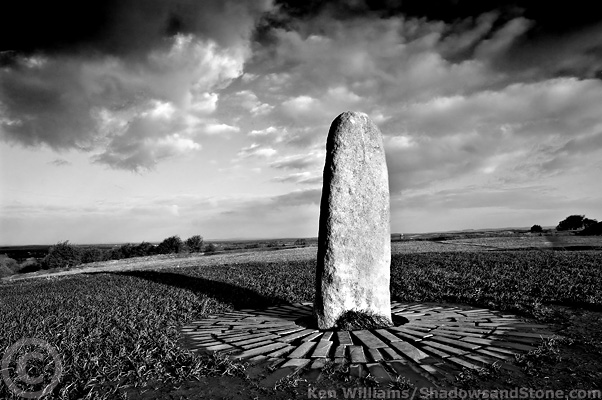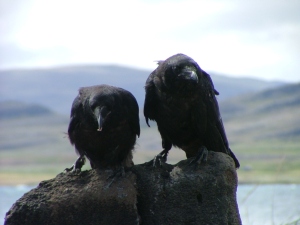
Lia Fail – Hill of Tara photo by Ken Williams http://www.shadowandstone.com
The world we have inherited is one where the Sovereignty of the Land has been broken. It’s not a single person’s fault. It’s not a specific generation’s fault. Throughout history, humanity has made a series of choices that have separated us from the spirit of the land, from the Otherworld, from nature itself. Our broken Sovereignty reveals itself in our poisoned rivers and oceans that are becoming barren, in the extinction of species and our dwindling biodiversity, in our melting icecaps and rising seas. Our unhealthy relationship to the Sovereignty of the Land is perpetuated when we vilify the poor instead of aiding them, when we foolishly act as if we have dominion over the Earth rather than acting as stewards of it, and when we turn our backs on justice in this land and do not stand in opposition to these false judgements of old men. As we withdraw ourselves from and choose to ignore the power of the land and the gifts of the Otherworld, the land sickens around us, our place on our planet becomes tenuous, and our societal priorities become selfish and obscene. As a species, we stand today at a crossroads, at a place in our collective Wyrd where the threads of our fates diverge, some leading to our continued survival, and some cut prematurely leading to our extinction among the multitudes of other species extinctions. Our path forward will not be an easy one no matter what choices we make, but there is a path ahead for us that will allow us a future, a path on which we encourage the return of the Sovereignty of the Land.
Before we can discuss restoring Sovereignty to the Land, we better take some time to define what I mean by the term. I will be referring to the primary three types of sovereignty that are used in most discussions on the topic and attempt to define them and untangle their meanings. The types of sovereignty that I’ll be referencing I’ll refer to as either political sovereignty, or the authority of a state to govern themselves or others, personal sovereignty also known as personal autonomy, and Sovereignty of the Land, the numinous power of the Otherworld channeled through the Sovereignty Goddess to the ruler of the land. These concepts are related, and each one has some influence with the others, but at their heart they all have different and nuanced meanings.
In a modern context, when the term sovereignty is used it is usually referring to political sovereignty, This is often the type of sovereignty that causes much of the confusion. It’s easy for us to look at the concept of Sovereignty of the Land in regards to Celtic lore and history and superimpose our modern concepts of political sovereignty over it. This can muddy the meaning of both types of sovereignty. The concept of political sovereignty, while crucially important to people’s lives, has become a corrupted by those with power. A militarily or economically powerful nation’s sovereignty is determined by their ability through war or trade to prevent others from imposing their will on them. In most cases, this type of political power is held through violence or the threat of violence. A good case study of how this dynamic works is the state of Native or First Nations Peoples on this continent. Technically, Native Peoples have been granted “sovereignty” for their tribal governments to rule themselves. Although they had no real right to do so, the US and Canadian governments granted Native Tribes limited rights to self-rule and government. In reality, they took this step not out of the goodness of their hearts or some sort of concern for the dignity of the people, but to appease the Tribes after destroying their livelihood, culture, and lives. This continent was founded by people who, through murder, rape, disease, lies, and genocide, systematically wiped out vast populations of people. The European people who colonized this continent have absolutely no legitimate claim to it. They arrived and through a fluke of technological achievement, specific biological resilience, and an arrogant spiritual philosophy of dominion over all of creation, they took it. Their claim of sovereign rights to the land they occupy rests on the childish and dangerous tenant of “I took it so it’s mine”. With this in mind, the idea of these illegitimate foreign governments bestowing the right of political sovereignty to the peoples that had been living here for thousands of years is tragic and delusional and we must always look at this connection to violence when we consider political sovereignty.
Personal sovereignty on the other hand is rooted in the cultural values of personal autonomy and self determination. It is based on the concept of a fundamental human right to self-determination. Retaining our personal sovereignty has been one of the great struggles of our time and this struggle takes countless forms today. The right for women to make decisions about their own bodies, right to express your free will, and our freedom of speech, all fall under the category of personal sovereignty. Personal sovereignty does not come without responsibility and cost though. To be able to have the type of autonomy and freedom that we desire and still live in a world populated with other sovereign individuals, we must be operating from a place of high moral accountability. Accessing your personal sovereignty is reliant on an understanding and acknowledgment of other people’s sovereignty and rights. We must understand and accept that we are part of a greater whole, that our actions affect others and affect the heath of the planet around them. Our own honor, integrity, and sense of justice must guide our decisions, coupled by connections to our community and understanding of the ecological world around us. In this way, personal sovereignty is much more closely tied to the Sovereignty of the Land.
When we speak of the Sovereignty of the Land, we are speaking of a concept that has been obscured by the mists of time. We see this classical and historical concept of sovereignty throughout the lore of ancient peoples. At the heart of this type of sovereignty is a contract and partnership with the Otherworld, the unseen spiritual world. In the traditional sovereignty tale, a King is granted his right to rule though the Otherworld. This power flows from the land through the form of the Sovereignty Goddess. This power is usually transferred in the form of a mead cup or the act of sexual union with the Goddess. The Sovereignty granted to the King is not unlimited power over his subjects, but a fluid force, the magical power of the land itself. A power that must used for the benefit of both the land and the people lest it be withdrawn. The Sovereignty of the Land flows from the Otherworld, is mediated by the King and from him flows back to the people to sustain them. This contract, like most agreements with the Otherworld, is conditional and strictly regulated through a combination of ritualized behaviors (Geasa) and mutual obligations between the ruler and his people. The failure of a King to meet their obligations either by breaking their agreements with the Otherworld or their people, resulted in withdrawal of Sovereignty which had disastrous effects such as crop failures and famine, the death of livestock, disease and hardship. In a situation like this, the failed King would step down, die in battle, or be sacrificed to allow a more suitable King to take their place.
Sovereignty of the Land was never truly about power over the tribe or the land. It was responsibility to both. A good King was not selfish but selfless, willing to cede power and sometimes his life for the benefit of his people. The health of the people and land reflected directly on the ruler. A single person starving from lack of food was abhorrent to Celtic society and to have someone starve on your doorstep brought great dishonor to you. In this system of Sovereignty, there was a strict social contract between the leader and the people. Bound in layers of obligation, hospitality, and geasa, the King had a sacred responsibility to care for and provide for his people. Our ancestors knew that community is essential to our survival, and also knew that connection and relationship with the Otherworld was necessary for our continued survival. Those in positions of power in our world today have forgotten both of these things. Our culture has cut all relevant ties to the Otherworld, and we have fetishized selfishness and self interest. We stumble forward, stepping on the backs of others with little care for their well being as we strive for personal gain. We are not appalled by our hungry neighbors, and we chose to create a land that is as dead as we perceive it to be. The Sovereignty of the Land has withdrawn from us and we have been left with a poisoned land and a broken society. Our leaders have failed us and we all suffer from their failings. We no longer live in culture where the leaders work for the benefit of the people and the land. Our leaders will not step down when they fail us and regrettably we can’t sacrifice them. We no longer have Kings ruling us and that is a good thing, because we live in an age where we can be more and more responsible for ourselves. Sovereignty has never left the land, we, as a society have chosen to ignore it and not to access it. In an age defined by self determination, it is up to us to restore the Sovereignty of the Land, to maintain relations and contracts with the Otherworld, to establish a mode of existing with the world and with each other that is sustainable and life affirming.
But how do we return Sovereignty to the land and how will that change our course? How will our connection with the Otherworld help create a better world for everyone? How will this provide for us a viable path ahead?
At the heart of this type of Sovereignty of the Land is interconnectedness. It is the acknowledgement that as a society our future survival is dependent on working with each other, not fighting against each other. It is understanding that on a greater level, our society’s survival and our ecosystem’s survival are intertwined. When the health of our planet fails, our health fails with it. When we cut ourselves off from our environment, from our communities, and from the Otherworld, we wither like a plant cut from its roots. And we are withering. Our bellies are full and we are starving to death.
We can take these basic steps and reestablish the flow of Sovereignty in our lives and in our land.
– Establish and maintain relationships with the Otherworld. Honor your Gods, honor the spirits of the land, honor your ancestors and make your choices for those that will come after us, not for ourselves.
– Establish and maintain relationships with your communities. Get to know your community and take part in it, both locally and globally. Don’t ask what you are getting from your community, ask how you are helping it.
– Give more than you take, in all things. Wealth and power are a flow, not something to hoard and hold onto.
– Stand for Sovereignty. Speak out where you see sovereignty being compromised. Defend others’ rights and their sovereignty, not just your own.
Taking steps to restore Sovereignty will not save us, but it’s the start of the mindset that we need to thrive again. Like a spring that has been buried, the flow of Sovereignty awaits us. As we dig into the soil with our bare hands we can restart the flow again: many trickles make a stream, many streams a river and many rivers fill an ocean. We no longer need Kings to mediate the Otherworld for us, we can take our fate into our own hands and restore Sovereignty to our Land.





